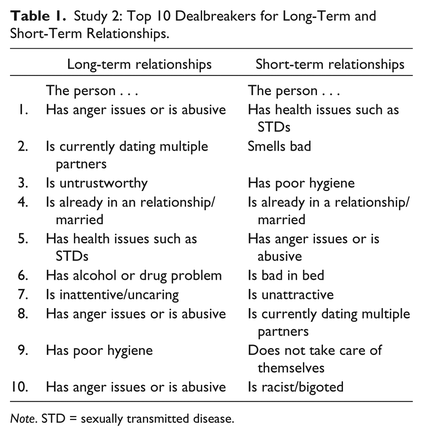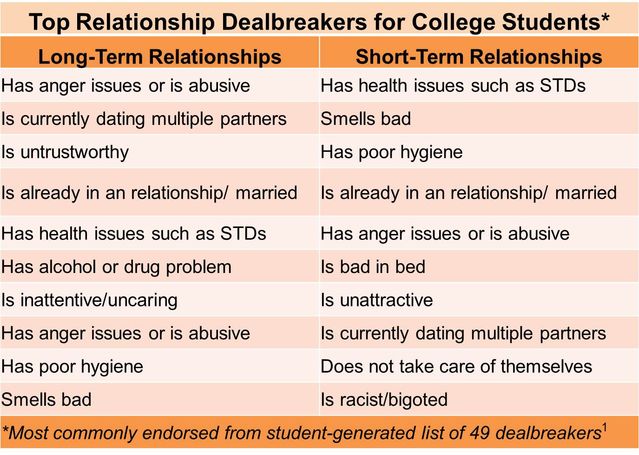Introduction
Deal breakers are the aspects or behaviors we cannot tolerate in a relationship. They are the things that make us want to end a relationship if they happen. Different people have different deal breakers. For some people, deal breakers might be cheating, lying, not sharing the same values, or not being supportive.
Knowing our deal breakers and communicating them clearly with our partners is essential. This way, we can set healthy boundaries and avoid unnecessary pain. We can also make better decisions about our relationship and its future.
Deal-breakers can help us create a solid foundation for a healthy and satisfying relationship. But we should also remember to put our own well-being and happiness first when it comes to deal-breakers in relationships.

Personal Values and Compatibility in Relationships
The success of a relationship depends mainly on the unique values and compatibility of the partners. Knowing the deal breakers can help people make wise choices about their relationships.
How different values affect relationships
When partners have conflicting values, they may face frequent arguments and misunderstandings. For example, they may disagree on religious beliefs, political views, or money management. These differences can cause severe gaps in the relationship. Therefore, both partners must talk openly and honestly about their values and find common ground to strengthen their bond.
The importance of compatibility in long-term goals and lifestyles
Another factor influencing relationship satisfaction is the compatibility of long-term goals and lifestyles. If one partner wants to have children and a stable home while the other prefers career growth and travel, they may feel unhappy and frustrated. They need to communicate clearly about their expectations and compromises to make sure they are aligned.
By identifying and addressing these potential deal breakers before they become major problems, people can improve their chances of having a healthy and fulfilling relationship.
Communication and Trust
Importance of effective communication in a relationship
Communication is the lifeline of any successful relationship. Open and effective communication fosters understanding, builds trust, and promotes a sense of connection between partners. It allows individuals to express their needs, desires, and concerns, creating a safe and supportive environment for both parties. Regular and honest communication helps resolve conflicts, manage expectations, and strengthen emotional bonds. Couples can avoid misunderstandings, improve intimacy, and maintain a healthy relationship by actively listening and responding empathetically.
Betrayal of trust and its consequences
Trust is the foundation of every successful relationship. When trust is broken, it can have severe consequences. Betrayal of trust, whether through infidelity, secrets, or broken promises, can shatter a relationship and lead to feelings of hurt, anger, and betrayal. It erodes the foundation of trust that holds a couple together and can cause long-lasting damage. Rebuilding trust requires sincere apologies, consistent actions, and open communication. It takes time, patience, and a commitment to transparency to repair the breach and restore the relationship.
Emotional Connection and Intimacy
Lack of emotional connection in a relationship
When it comes to relationships, emotional connection is vital. If you find yourself in a relationship where there is a lack of emotional connection, it can be a significant deal breaker. Emotional connection involves trust, vulnerability, and understanding. Without it, the relationship may feel shallow and unfulfilling. Communication becomes strained, and you may feel like your needs are not being met. This can lead to feelings of loneliness and dissatisfaction.
Unfulfilled intimacy and its impact on the relationship
Intimacy plays an essential role in a healthy relationship; if it is lacking or unfulfilled, it can be a deal breaker. Intimacy goes beyond physical affection and includes emotional closeness, trust, and support. When intimacy is absent, the relationship can become distant and disconnected. A lack of passion and excitement may lead to dissatisfaction and resentment. It is crucial to address any issues surrounding intimacy in the relationship and work towards finding a solution that meets the needs of both partners.

Compatibility in Interests and Hobbies
Regarding relationships, having shared interests and activities can play a crucial role in shaping the overall compatibility between partners. Although differences can add excitement and variety, sometimes they can become deal breakers.
Significance of shared interests and activities in a relationship
Having common hobbies and interests can strengthen the bond between partners. It provides opportunities for quality time, enhances communication, and promotes teamwork. Engaging in activities that both partners enjoy can also foster a sense of shared goals and values, leading to a deeper connection.
Differences in hobbies and interests as deal breakers
While some differences in hobbies and interests can complement and enhance the relationship, specific disparities can strain the bond. For instance, if one partner enjoys spending weekends hiking and exploring nature. At the same time, the other prefers staying indoors and playing video games; it can create a disconnect and lead to isolation or frustration.
Finding a healthy balance between shared interests and respecting individual preferences is essential for maintaining a fulfilling and harmonious relationship. Communication, compromise, and mutual understanding are vital in navigating potential differences related to hobbies and interests.

Core Differences and Incompatibilities
Compatibility is key in relationships. However, certain differences and incompatibilities can serve as deal breakers. Addressing these issues early on is important to avoid future conflicts that could potentially end the relationship.
Dealing with fundamental differences in personalities and values
- Address Communication Styles: If you and your partner have drastically different communication styles or struggle to understand each other, it can be a significant obstacle to building a healthy relationship.
- Respect for Boundaries: Respecting each other’s boundaries and values is crucial. Finding a compromise may be challenging if you have fundamental differences in what you value or how you want to live your life.
Addressing significant incompatibilities that cannot be resolved
- Long-Term Goals: If you and your partner have conflicting long-term goals, such as wanting different lifestyles or career paths, it can lead to significant challenges in the relationship.
- Deal Breakers: Some things are simply non-negotiable. Whether it’s differences in core values, beliefs, or deal-breaking behaviors, it may be best to walk away if the incompatibility is too significant.
It’s important to remember that every relationship is unique, and what may be a deal breaker for one person may not be for another. Trust your instincts and prioritize your well-being when evaluating potential deal breakers.

Importance of Respect and Mutual Support
Respect and mutual support are vital components of any relationship, romantic or platonic, for its success and longevity. Without these foundations, the relationship is prone to crumbling under unresolved conflicts and constant negativity.
Lack of respect and support in a relationship
A lack of respect creates an unhealthy dynamic where one feels belittled, dismissed, or undervalued. This can manifest in various ways, such as demeaning comments, disregarding boundaries, or consistently ignoring the other person’s needs. On the other hand, a lack of mutual support generates feelings of isolation and neglect, leaving one partner feeling unsupported and unappreciated.
Recognizing deal breakers related to disrespect and lack of support
Recognizing deal breakers related to disrespect and lack of support is crucial for taking necessary action in a relationship. Some red flags include continuous disrespect, dismissive behavior, consistent lack of emotional support, and a refusal to address and resolve conflicts healthily. It’s essential to prioritize self-respect and know when to walk away from a relationship lacking respect and mutual support.
Deal Breakers Related to Infidelity
The impact of infidelity on a relationship
Infidelity can have devastating effects on a relationship. It erodes trust, creates emotional pain, and can lead to the breakdown of the partnership. When one partner violates the commitment of exclusivity, the other partner may feel betrayed and struggle with anger, hurt, and insecurity. Rebuilding trust after infidelity can be a long and challenging process, and for some, it may be an insurmountable obstacle. That’s why many people consider infidelity as a deal breaker in their relationships.
Considering deal breakers related to cheating and unfaithfulness
For some individuals, infidelity is an absolute deal breaker. They believe that a relationship built on trust and loyalty cannot survive the breach caused by cheating. Others may be open to forgiveness and reconciliation but expect complete honesty and a commitment to rebuilding the relationship. Couples need to have open and honest conversations about their boundaries and expectations regarding infidelity to ensure both partners are on the same page. Ultimately, the decision on whether infidelity is a deal breaker or not depends on the individuals involved and their willingness to work through the challenges it presents.

It is essential to have a clear understanding of the deal breakers in any relationship. Deal breakers refer to the boundaries and non-negotiables that can make or break a relationship. It is crucial to identify and communicate these deal breakers to have a healthy and successful partnership.
Deal breakers help set guidelines for what is acceptable and what is not in a relationship. They help set boundaries and ensure that both partners are on the same page. By being aware of these deal breakers, individuals can make informed decisions about their compatibility and prevent unnecessary conflicts in the long run.
People may have different deal breakers based on their values, beliefs, and experiences. It is important to identify these deal breakers early on in a relationship to avoid investing time and energy in something that may not work out. By understanding and respecting each other’s deal breakers, partners can build a stronger foundation for a successful and fulfilling relationship.

